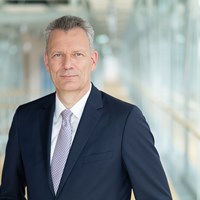Security of supply and climate targets the driver for Uniper’s terminal plan
The energy industry is currently in the focus of public and political attention. What is Uniper doing to secure Europe’s energy supply?
The future of our energy supply is on the brink of transformation. As a matter of principle, we must be aware that Europe’s energy supply needs to make quite enormous efforts to ensure security of supply for industry and private households. Russia’s war against Ukraine has shown us how important a secure supply of raw materials is for the prosperity of our country.
But it also showed us how agile industry and politics can work together when it comes to solving problems and pushing ahead with necessary large- scale projects. For Uniper, as a system- relevant company, this means that we will use our experience in gas trading, gas storage, and the development of renewables to secure German and European supplies and move forward into a stable future.
What does that mean in concrete terms?
We already purchase gas from a wide variety of sources around the world, including the USA, Norway, Azerbaijan, the Netherlands and others. However, we will press ahead with diversifying our sources of supply even more vigorously. In the short term, the SPOT market will also be very important for us to supply industry and households and to ill our gas storage facilities, by the start of the coming winter. At the same time, we will be commissioning our LNG terminal in Wilhelmshaven by winter 2022/2023.
The Wilhelmshaven site offers ideal conditions from both a maritime and logistical perspective. LNG tankers of all sizes will be able to call at the facility regardless of tides and in line with the highest international safety standards. All that is needed to connect the terminal to the existing natural gas pipeline network is a pipeline of around 30km. This terminal is expected to handle up to 7.5 billion cubic metres of natural gas per year as quickly as possible.
This corresponds to around 8.5% of Germany’s current annual gas demand. But this will not be the end of the story in Wilhelmshaven. In the medium and long term we are setting the course for an even more climate- friendly energy supply with our “Green Wilhelmshaven” hydrogen project and making the site a hub for climate- friendly hydrogen.
Will Uniper focus on decarbonisation and renewables in the future?
The current geopolitical situation shows how urgently we will need gas in the medium term to ensure our security of supply and achieve our climate protection targets. Germany and Europe are strong industrial regions with a high standard of living, and we intend to maintain them as such. But without gas as a bridge to a fundamental transformation of our industry, we will not be able to achieve our ambitious decarbonisation targets.
The example of Wilhelmshaven illustrates what such a bridge can look like in concrete terms: Under the heading “Green Wilhelmshaven”, we will turn the site into a hub for climate-friendly hydrogen. An import terminal for green ammonia is planned. The terminal will have a so-called ammonia cracker to produce hydrogen and will be connected to the future hydrogen network. In addition, an electrolysis plant in the range of 410 megawatts is planned.
Together, the import terminal and electrolysis plant would produce around 295,000 metric tons of hydrogen, enough to meet around 10% of the demand for the whole of Germany in 2030. At the same time, a new decade is dawning for wind and solar energy. While the growth of renewables in the past was built almost entirely on subsidies, they have now reached grid parity in many countries.
This marks the beginning of a new era of market-based growth for renewables, which Uniper and its partners will drive forward with expertise in power purchase agreements and our own solar and wind projects.
KEEPING THE ENERGY INDUSTRY CONNECTED
Subscribe to our newsletter and get the best of Energy Connects directly to your inbox each week.
By subscribing, you agree to the processing of your personal data by dmg events as described in the Privacy Policy.
















